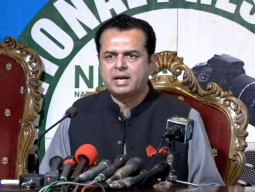
An IMF delegation, led by Middle East and Central Asia Department Director Jihad Azour, "looked forward to a continuing partnership with the State Bank (of Pakistan)," the central bank said in a statement on Thursday.
Azour also shared his views on how central banks in the region were responding to the challenges facing them, "particularly with regard to capital flows, the role of technology, and the role of central banks in economic management, amongst other areas".
Pakistan signed the 13th loan programme since 1988 with the IMF worth $6 billion in May. The international financial institution released the first tranche of $991.4 million (SDR716 million) of the 39-month loan programme in the second week of July.
The loan programme binds the government to undertake structural reforms. These included an increase in key interest rate to an eight-year high of 13.25% in July, depreciation of the rupee by 32% to Rs160 to the US dollar in FY19, upward revision in power and gas tariffs and an ambitious tax-collection target of Rs5.55 trillion for the current fiscal year among other tough conditions for steering the economy out of the crisis.
The reform programme has so far managed to narrow down the historically high current account deficit and helped in the inflow of significantly higher remittances from overseas Pakistanis in July and August – the first two months of the current fiscal year 2019-20.
However, the reform programme has resulted in a slowdown of the economy to a nine-year low of 3.3% in the fiscal year that ended on June 30, 2019 and pushed inflation into double digits – 10.5% – in August after a gap of almost 69 months.
The IMF would formally make first economic review of the loan programme in the end of October or beginning of November this year. Azour said the other day Pakistan's commitment and the level of preparedness to implement the required measures showed that it would not be a single-tranche programme.
SBP Governor Reza Baqir informed the delegation that the implementation of home-grown economic reforms under the loan programme had started bearing the fruits. He said the business confidence has been improving gradually, volatility on rupee-dollar exchange rate has come to an end, foreign currency reserves have started improving and inflationary pressure is expected to recede in second half of the current fiscal year.
He assured the IMF of achieving consistency in implementing the reforms, as the achievement of the desired results in the economy were at early stage under the programme.
"The transition to a market-based exchange rate system, building foreign exchange reserves, and bringing down inflation were key elements of the SBP's reform programme to restore financial stability and lay the foundations for sustainable and shared growth," Baqir said in the statement.
Inflation had risen due to the economic imbalances accumulated from previous years but "inflationary pressures are expected to recede in the second half of the current fiscal year," he anticipated. "The initial results from the reform programme are encouraging. The earlier volatility in the exchange market and associated uncertainty has subsided and confidence is slowly improving."
The SBP governor emphasised that these were the early stages of the reform process and it was essential to sustain the reform momentum and to keep policies focused on securing stability and promoting sustainable and shared growth.
Baqir looked forward to a continuing fruitful partnership with the IMF and other stakeholders in the international financial community to support this reform programme.
The IMF delegation, which also met the senior management of the SBP, included its Mission Chief to Pakistan Ernesto Ramirez Rigo; Resident Representative for Pakistan Teresa Daban Sanchez and Special Assistant to the Director of Communications Department Olga Stankova.





1732350304-0/BeFunk_§_]__-(39)1732350304-0.jpg)
1732340798-0/BeFunk_§_]__-(35)1732340798-0.jpg)



1732343209-0/BeFunk_§_]__-(36)1732343209-0.jpg)






COMMENTS
Comments are moderated and generally will be posted if they are on-topic and not abusive.
For more information, please see our Comments FAQ